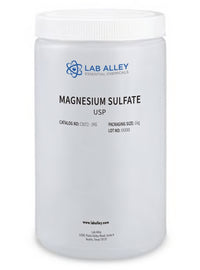Magnesium Sulfate
Magnesium Sulfate
Also Known as Epsom Salt
About Magnesium Sulfate
Magnesium sulfate, colloquially known as Epsom salt, has long been renowned for its therapeutic effects. Epsom salt is named for the mineral springs in Epsom, England, which were observed to have high magnesium concentrations in the 17th century. Healing properties are similarly attributed to the magnesium-rich Dead Sea waters.
Magnesium sulfate may be used orally or topically for the treatment of various conditions. It is approved for the treatment of eclampsia and preeclampsia in pregnant women, and may also prevent preterm labor. It may be supplemented orally in cases of hypomagnesemia. Because magnesium decreases the amount of acetylcholine released at the neuromuscular junction, it inhibits nerve impulses to induce muscle relaxation.

Topically, magnesium sulfate is thought to have therapeutic effects for skin conditions like psoriasis and dermatitis. While scientific evidence for topical therapy of magnesium sulfate is lacking, there is at least a palliative effect and ample anecdotal support. Magnesium sulfate is also thought to have an antinociceptive and anti-inflammatory effect in the topical treatment of muscle and joint pain.
Common Uses and Applications
- Balneotherapy
- Dermatology
- Obstetric medication
- Muscle relaxant
- Laxative
- Oral supplement
Industries
- Pharmaceuticals and supplements
- Dermatology
- Obstetrics








